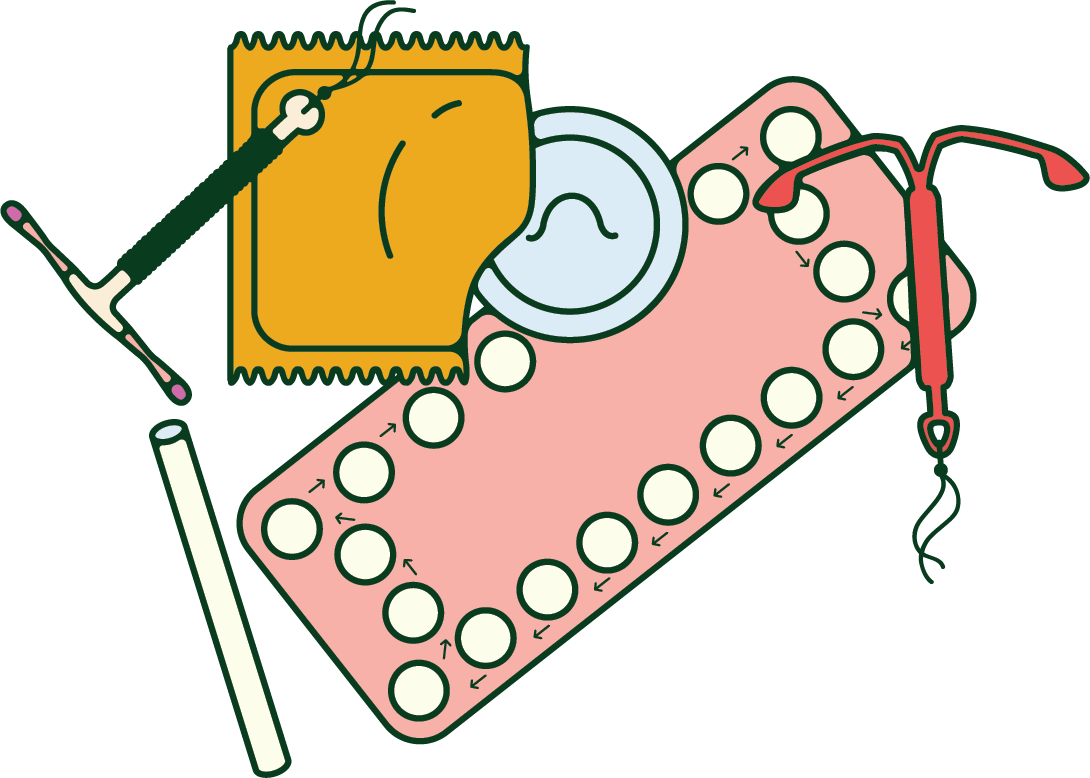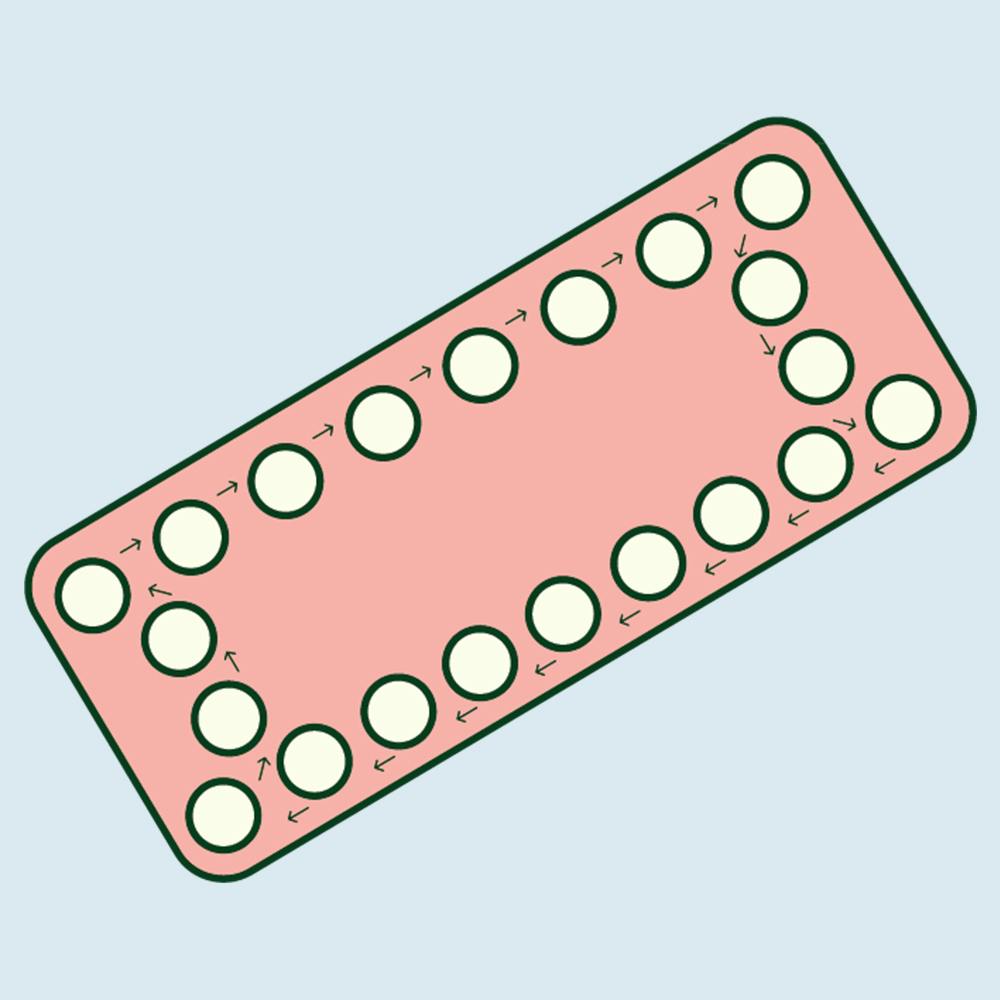Table of contents
1. Q. I am wondering what are the safest contraceptive choices on the market right now for couples where a woman does not want to go on a pill. Would love some stats, cons and pros for each, including both male and female options.
2. Hormonal contraception
3. Non-hormonal contraception options
4. Contraception for men
Illustrated by Erin Rommel
Q. I am wondering what are the safest contraceptive choices on the market right now for couples where a woman does not want to go on a pill. Would love some stats, cons and pros for each, including both male and female options.
As someone who has tried just about every form of contraception out there after terrible experiences with the pill in my early twenties, I feel fairly well versed on this subject. For added support and stats, I asked Alice Pelton, founder of The Lowdown, the world’s first review platform for contraception.
Over recent years more and more women are straying away from the pill as the main form of contraception, and seeking out other options. This is something Alice has observed on an anecdotal level, too.
“Over 60% of women reviewing the pill at The Lowdown report a negative impact on mood – and around 50% a loss in sex drive,” she tells me.
“[The pill] has its benefits (skin improvements, cycle control and can protect against certain types of cancers), but millions of women suffer from side effects. So much more needs to be done to develop new better methods that give humankind better options!”
Hormonal contraception
You didn’t explicitly state your motivations for wanting to know about non-pill forms of contraception, so I’m going to include info on both hormonal and non-hormonal forms of contraception.
"More women are moving away from the pill to long acting options like the hormonal intrauterine system (IUS), implant and injection, as these are more effective, and you don't need to remember them every day,” says Alice.
"Of these hormonal options I would recommend the hormonal IUS – it consistently gets the highest overall satisfaction ratings on The Lowdown, and releases a much lower dose of hormones in our body so our data shows it seems to affect our mood, sex drive and weight less than the pill.”
For the uninitiated, an IUS is the hormonal version of the coil, sometimes known by its brand name, the Mirena coil. It’s placed inside your uterus via a short procedure with a gynaecologist or sexual health nurse. Once there, it is effective for 3-7 years, and can be removed at any time, which means that, unlike the injection, if you find you don’t get on with the hormonal IUS, you don’t have to commit to the hormones for three months.
Non-hormonal contraception options

Alice helpfully provided the user rankings for non-hormonal options on The Lowdown. Coming in first place is fertility awareness methods (FAM), which scored 87% in terms of user satisfaction.
“There's been increasing uptake of FAM in recent years,” she says, “with more of us getting into tracking our cycles and loving getting in touch with their body and hormones. It takes patience and curiosity to get right! But there are also no side effects.”
In terms of pros, Alice said a lot of users report that they find it interesting learning more about their hormone patterns and the interruptions to intercourse when you’re actually getting down to it are non-existent. But – and there is a but – a lot of people are hesitant because although symptothermal method is shown to be 98% effective in some studies, you still need to use condoms or abstain for around ten days a month, and we’ve all heard horror stories about people getting pregnant using FAM.
If you’re someone who’s prone to worry someone who has an irregular working life, someone who wants to be able to have sex all the time or someone who doesn’t have regular periods, this one is maybe not one for you.
“The copper intrauterine device (IUD) is the most effective, long term non-hormonal contraceptive out there,” says Alice. It can also be used as an emergency contraceptive. “It lasts 5-10 years, and if you can get used to having heavier bleeds (70% of reviewers), it’s worth looking into,” says Alice.
As someone who has had an IUD for three years, I have to say I’m a fan – but it took a couple of insertions for it to settle properly and a few months of more painful periods, so it wasn’t all plain sailing from the beginning. In my case, I love knowing there aren’t any extra hormones flying around my body, as I’ve struggled with panic attacks on the pill.
Contraception for men
I’d like to preface this by saying that a dearth of research and development in male forms of contraceptives means that there hasn’t been much innovation in the area, so you’re pretty much left with two options: condoms and vasectomy.
“Many couples are getting back to basics and using condoms, as a simple and sometimes short-term solution,” says Alice, “although they’re not always the best for interruption.”
Roughly translated…. You have to have pre-empted the sex and bought them ahead of time, which for some people just doesn’t work. But for those who can handle a bit of forward-planning, they have the added benefit of protecting you from sexually transmitted infections (STIs), which none of the other options listed here do.
It’s worth pointing out here that if you’re having sex with a new partner or tend to sleep with multiple people at once, then it’s safest to use condoms even if you’re using another type of contraception. They are 98% effective and you can often pick them up for free from sexual health clinics.
“The vasectomy is often overlooked and I don't know why,” says Alice. “It can be done under a local anaesthetic and all being well, the man can be out of the GP surgery in half an hour and should recover within a week.” It’s also important to note that vasectomies can be reversed if you decide later to have children, although this isn’t usually covered on the NHS, so can be spenny.
For those who don’t want a family or who have already completed theirs, as Alice says, “it's basically like getting an IUD fitted.” She goes on to say that she has “no idea why more blokes don't do this after they've decided they don't want a family,” although I can think of a few reasons why this might be.
If you’d still like more advice, there’s a lot available on the NHS website or get in touch with your local sexual health clinic or your GP, who can give you more detailed advice. To read more about different women’s experiences and their rating of each option, check out The Lowdown.






